Politics in Comics: Animal Man and Animal Rights
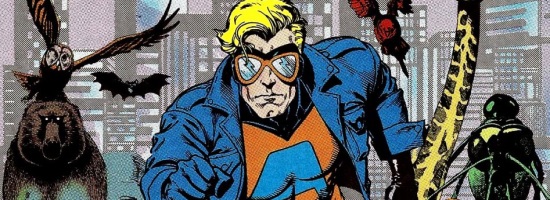
In 1988, Grant Morrison – who had, at the time, come to DC Comics’ attention due to his work on the 2000AD story Zenith – proposed a rebooted comic book series for the C-list Silver Age character, Animal Man. Before this, A-Man had been just another “gimmick” hero, enjoying some popularity within the pages of Strange Adventures and appearing as a guest character in more well known titles on occasion. However, in the pages of the Vertigo imprint series of Animal Man, the character took on a new lease of life, and a new purpose in Morrison’s hands. Animal Man, in short, had become – among other things – a champion for animal rights.
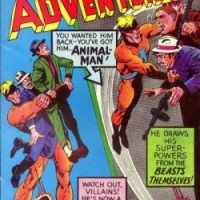
Of course, to discuss Animal Man’s modification into a more politically-minded series, it’d be a good idea to look over the origins of the character himself. Bernhard “Buddy” Baker was created in 1965 by comic book writer Dave Wood and artist Carmine Infantino, famous as the man who designed the Silver Age incarnation of the Flash. A-Man first appeared in Strange Adventures #180, a science fiction title published by DC throughout the “Silver Age of Comics,” and would appear regularly in the title until issue #201, where he was replaced by Deadman as the book’s main focus. During a hunting trip – anyone detect the irony there? – Buddy encounters a crashed alien spaceship, which detonated, bathing him in radiation as it did so. As is usually the case with comic book origin stories, the incident gave him superpowers; he could call upon the abilities of the animals around him and adapt them into various superhuman abilities to use against criminals. This origin was revised by Morrison in the initial issues of his run on Animal Man, as he felt that the original explanation was too unbelievable. In his new origin story, Buddy encounters the ship while hunting, as he did before, but this time it doesn’t blow up in his face. Instead, the aliens inside experiment on him, genetically modifying him and allowing him access to a “morphogenetic field,” which lends him his ability to borrow powers from the animal kingdom. It’s worth noting that in both incarnations, Animal Man does not physically change in order to use these abilities, unlike heroes such as Beast Boy; for example, if he were to borrow the ability to swim rapidly from a fish, he wouldn’t develop fins or anything like that.
Speaking of changes, Buddy Baker’s transformation from part-time superhero to full-time animal champion isn’t unique in the world of comic books. John Stewart, introduced as Earth’s Green Lantern in 1972, was initially used as a way to explore the effects of racism in modern society. Similarly, Wonder Woman has long been associated with feminism and the women’s rights movement, and many writers have explored this status in their work. Steve Ditko, famous as one of the two masterminds behind Spider-Man and Doctor Strange, created a slew of characters to discuss political and philosophical ideas, such as Mr. A and the Question. He also teamed with Steve Skeates to create Hawk and Dove in 1968, a series which they intended to use as a way of examining the political divide rapidly becoming evident in the United States during the 1960s and 1970s. Clearly, politics and comic books have gone hand in hand for a long time, and Grant Morrison’s work on Animal Man was following in this grand tradition. Still, even if it isn’t an especially rare title in terms of it’s socio-political aspirations, the discussions in Animal Man are still excellent examples of the sort of political messages writers will often weave into their stories. In some ways the series is still unique even amongst it’s peers; it is, perhaps, one of the most self-aware stories of it’s kind ever to have been written – though we’ll get into why that is in just a moment.
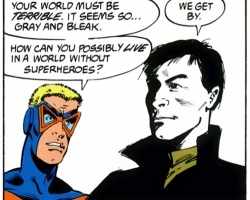
So what drives writers to turn their stories into something more than just men and women battling evil in tights? The simple, somewhat not-very-satisfactory answer is; a variety of reasons. It seems most likely, however, that there is something about a character’s powers or background that make them admirably suited to champion a certain cause; In the case of Buddy Baker, ex-stunt man turned animal-powered vigilante, it seems fairly obvious that his name and abilities make him a bit of an obvious candidate for animal activism. Morrison himself broadly focussed on three main areas of his own personal philosophy, that of animal rights, vegetarianism and the role and purpose of family in a world where alien invasions, fantastic powers and terrifying occurrences are the norm. At first, Buddy’s adventures are fairly true to type for comics with a political spin. In the first few issues, he helps free monkeys bound for needless vivisection, punishing the scientist in charge quite horribly as he does it. In a later issue, A-Man helps a radical environmental group save dolphins from slaughter by the fishermen of the Faroe Islands. The latter story is particularly interesting, as not only are A-Man’s actions progressively more violent as the tale goes on, but he also chooses to associate with a group of self-confessed eco-terrorists in order to achieve his goals. Despite the moral dilemmas and Buddy’s own self-questioning, up until this point Animal Man is more or less what readers might expect from a comic with a political message. However, it’s in the final act of the story, so to speak, that Morrison’s tale really begins to stand out from the crowd. Buddy Baker, fresh from disaster, meets with his re-creator, Grant Morrison himself, and talks with him about the merits and drawbacks of the comic itself. They discuss violence in media, the rights of authors to use characters to champion their own personal causes and the nature of reality, skewing from politics to philosophy in the span of around ten pages. The debate even includes an admittance from Morrison that the messages he tried to convey were “preachy” at times, a confession made all the more interesting and bizarre by it’s audience – the very character Morrison was using to convey those messages!
To call Animal Man surreal would be to make a particularly hilarious understatement. However, as a political piece of work, it is – in this writer’s opinion – absolutely fascinating. At points, Morrison’s writing can come across as somewhat heavy-handed, particularly in the sections of the story that focus exclusively on animal rights. The first issue of the run, which deals with vivisection, and issue #15, which concerns itself dolphin hunting near the Faroe Islands, are particularly heavy-handed; if nothing else, the writer’s passion for his cause is extremely evident. Overall though, the issues are explored in an extremely cutting and engaging way, and unlike some comics with a similar purpose, Animal Man never loses focus on the fact that these events are also a test of Buddy’s character and moral fortitude. His decisions aren’t presented as perfect ones in the pages of these stories, and he is never portrayed as a hero whose righteousness cannot be doubted. For me, at least, this was one of the things that made it so easy to forgive the occasional propaganda-like elements of Morrison’s writing, something greatly enhanced by the already-discussed ending of the arc, and the self-awareness exhibited therein. The fact that, even when at his most “preachy,” Morrison is capable of presenting A-Man as more than just a political standard alone makes Animal Man worth the praise it gets. When you consider just how rare a self-aware piece of political fiction can be, it’s utterly remarkable that this particular tale is able to avoid becoming a simple black-and-white morality story.
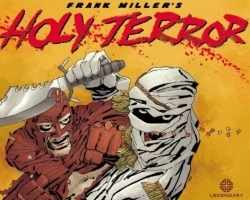
That said, while Morrison may avoid the trap – for the most part – of converting Animal Man into a political diatribe, other authors have been less able to avoid such accusations. Perhaps the most infamous example is Holy Terror, a graphic novel that it’s writer, Frank Miller, expressly admits to being a propagandistic examination of terrorism and Islam in general. It is fair to say that the critics did not like it, and upon reading it, it’s not hard to see why. It’s brutal stuff, and as with any work given the label “propaganda,” it’s message – that Islamic terrorism (and apparently Islam generally, given that the author doesn’t go to any trouble to make a distinction) is a terrible, real threat to the freedom and security of the United States – is about as blunt as you can imagine. This isn’t the first time Miller has allowed his political views to enter a story, either; a less recent example would be his work on All-Star Batman and Robin the Boy Wonder, and his depictions therein of the killings of corrupt cops, the near-veneration of Batman’s violent and morally dubious vigilantism as “justice” and the characterisation of Wonder Woman as a brash, violent, hypocritical straw feminist whose assessment of her own powers and place in the world borders on narcissism – and really, given how unsubtle that last critique is, it’s pretty easy to theorise where Miller stands in regards to feminism, all in all. Miller has, in the past, received his fair share of accolades, but these works brought a lot of criticism, and even the most charitable amongst us would have to call them controversial at best.
But then, that’s the trade-off with politically minded comics. Even Animal Man, as I mentioned earlier, has moments where the writing is very close to propaganda itself. Some people may even find themselves disliking the heavy tone of Morrison’s work on the title for precisely that reason; it would be fair to say that Animal Man’s occasional moments of one-sidedness can be frustrating, if you aren’t especially invested in animal rights yourself. Like every piece of political media produced, for every person a comic book story hits a note with, there’ll be another for whom it represents a problem, a point of view to be contested. In modern times, the heated debates over representation in comics indicates – if nothing else – that the tradition of political discussion within the pages of comic books is still alive and well, and that it continues to inspire passionate responses of all kinds amongst the readership. Whether you agree with the themes and discussions presented in Animal Man or not is entirely up to you; either way, as long as the author can succeed in provoking both thought and debate, then in my mind a politically-infused comic book has served it’s purpose… even if it wasn’t in the way that it’s author intended!
What do you think? Leave a comment.



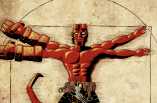
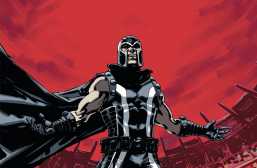
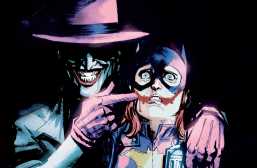
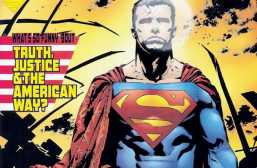
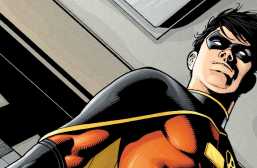
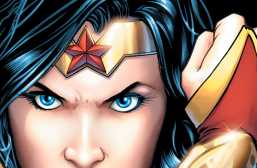
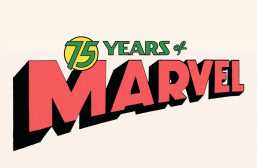
Grant Morrison run was the best closely followed by Jeff Lemire’s.
I recall wanting veal after reading one of the AM comics but now I am wondering weather the preaching converted anyone. The comic did make me feel more negative towards animal rights but did anybody out there join PETA or go vegan because of it?
I recall deciding to look into the issues a bit more closely after giving it a read, and I’d say it started me down that route, though I’ve never gone vegan/vegetarian because of it and have negative opinions of PETA’s activities. I’ve always felt that Morrison’s work is not the kind that gets “meh” reactions – it gets a strong reaction out of you either way.
I love Morrison’s run of Animal Man. Not everyone like it, but you are entitled to your own opinion. He is one of few great comic book writers working this day or in any other era. He doesn’t always get it things right, nor does everyone love him [AND nor should they]. I do not particularly like Alan Moore’s output, but I admit he’s light years ahead of just about every other creator. Morrison’s output has been so much better than most of his contemporaries.
Couldn’t agree more! As I said above, Morrison is a love-or-hate kind of writer for me, but I can never accuse him of leaving me bored. I loved his work on Animal Man, and though he’s done work since that I disliked intently, I still feel he’s an excellent writer overall.
Great article man. We have some great superhero activists like Firebrand, Doctor Goodwrench, Sigjid Roskoff, to name a few!
In relation to our Spanish world, a political artist named Ruis was central in “how to comics”. He would use his work to explain social issues such as marcism, poverty, cat church… Who said comic books aren’t useful.
Outstanding read. I liked Animal Man right away from the first time I read his com. I particularly enjoyed Buddy because he is a family man, an average normal guy even with the superpowers, and I like him because he has a clear driving motive. We all know Morrison was using Buddy as a mouthpiece for his own animal rights agenda.
I love the family interactions in these stories. They feel like the sorts of things families would actually do and say to one another, and it really helps ground the series… before things get REALLY weird, anyway. Thanks for the compliment, by the way!
Comic books supports a socially liberal view-point. Comics medium was one of the leading sources to advocate for social justice and acceptance towards religious and racial minorities. These super-heroes exists to assist those who can’t or will not help themselves, against tyranny, against crime, against oppression.
That was well-written, Sean. A very considered discussion.
I’m not so well versed in Morrison’s work as I might like to be, but it seems to me, having read his Flex Mentallo mini-series, that he wanted to pull away from the involvement of comics with politics post-Animal Man. Having said that, We3 is a return to the animal rights topic, so perhaps what he wanted was to shift focus away from the dark and gritty style, the political bent of Moore’s work in the 80s and 90s, back towards the fun element of comic books? We3 has a message, yes, but its not nearly so fatalistic as the likes of Watchmen. Or maybe I’m rambling.
A well written and enjoyable read, thanks for writing!
AM lost me fairly quick for many of the reasons above. It WAS a bit too preachy, but it also didn’t flow very well compared to most other Lemire works.
The New 52 run, you mean? Yeah, I’m still in two minds about that myself. I’m not quite sure whether I like it or find it a bit too drawn out at points!
This was a beautifully focused and clear article. I like my comics, but I hadn’t come across this guy before- well worth a read!
The sheer contrast between the two works – Animal Man being waaaaay back in Morrison’s catalogue and Holy Terror being one of Miller’s more recent – says a lot about how the one guy’s mellowed and explored his own psychology and the other’s gone kinda loopy, I think.
Good choice. Comics get into politics often, and this is one that I rarely see used as an example.
What an interesting character! Maybe I’m just sheltered, but this is my first time hearing about Animal Man, and I’m really glad you wrote about him. Right off the bat I thought he would just be a terrestrial version of Aqua Man, but your article makes me think that he may be more complex than what I expected. As much as I love characters with un-doubting righteousness and conviction, heroes who question themselves and use unorthodox means to an end (like lining up with a type of terrorist group to save dolphins) really get my attention and stir up a much more emotional response/connection to the reader. I like how you referenced Frank Miller’s work to show examples of the boundaries/difficulties/complexities of propaganda within comics- it really helps illuminate how Animal Man can be read as complex propaganda.
I’m excited to go and find out more about Animal Man- thank you!
Thanks for your kind words, Gray! I have to admit, one of the absolute joys of this run is the way it deals with A-Man’s moral dilemmas and how he balances them all. To be honest with you, I feel like (at this stage) Frank Miller has unfortunately become a shining example of “How not to write political comics,” but then that’s just my interpretation.
Speaking of Aquaman, I think you might be surprised at how complex his stories can get – though you’ll have to wait for another article to see why, I’m afraid!
I applaud your even-handed analysis of a writer who always elicits strong reactions from readers (one way or the other). Your larger point about political comics blurring the lines between political engagement and propaganda raises an important, foundational question about the medium of comics, where subtlety and nuance haven’t always been particularly valuable qualities, especially in a superhero book. It would be really interesting to situate your argument within an even larger context: the longstanding (and ongoing) connection between visual storytelling and actual government-sanctioned/financed propaganda (I’ve got that iconic imagine of golden-age Cap punching Hitler in mind as I write this).
Excellent article! I own Morrison’s “Animal Man” series and enjoyed it during my first reading, but now I have to read it again.
Excellent article!!
Morrison definitely seems to want to exemplify in art the issues of the age in which he wrote.